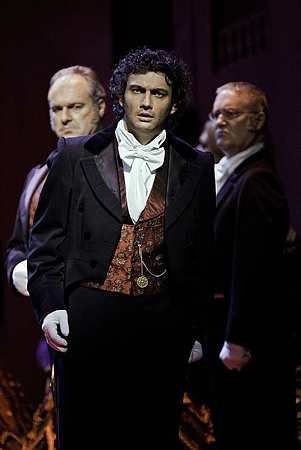|
|
|
|
|
|
|
|
| Bloomberg News, 16 January 2008 |
| Warwick Thompson |
Verdi: La traviata, Royal Opera House, 14 January 2008
|
Sell the Ferrari for Tickets to 'Traviata'
|
|
|
 The Royal Opera audience had the expectant look
of chicks with their beaks open. Outside, ticket touts were demanding
extortionate amounts. Elderly patrons on crutches rushed past as the final
bell rang. The Royal Opera audience had the expectant look
of chicks with their beaks open. Outside, ticket touts were demanding
extortionate amounts. Elderly patrons on crutches rushed past as the final
bell rang.
Such was the pulling power of glamorous soprano Anna Netrebko, who made her
debut as Violetta in Verdi's ''La Traviata'' (1853) at Covent Garden in
London. It didn't lessen the excitement that the cast included tenor
Jonas Kaufmann and baritone Dmitri Hvorostovsky, two more top stars.
Fortunately, it was worth all the brouhaha.
Looking porcelain-fragile in a tight bodice and creamy crinoline folds,
Netrebko sat still and pensive as the overture played. As Act 1 unfolded, it
became clear that stillness and quiet intensity were to mark her
performance.
When she wanted to signal her despair at the repeat of ``Sempre libera''
(Always free), she reined in her dark rich voice to a pianissimo and drew us
in to the character's inner turmoil. Acquiescing later to demands to
sacrifice her lover, she sang in a whisper blanched of all emotion.
Yet she also could stoke her dramatic fire when she wanted, and her fiery
cry of ``morir si giovine'' (``to die so young'') in her death scene was
heartbreaking.
She also took a great risk in singing several passages to the back of the
stage. The effect was remarkable, as if Violetta were searching for some
private clue to her destiny.
Violetta on the Floor
Her acting was full of such detailed touches. After her lover Alfredo had
callously thrown his gambling chips at her in another scene, she scrabbled
around on the floor to pick them up and then cried as she held them against
her face. It was a powerful way of suggesting that she accepted, in despair,
his valuation of her as a prostitute.
This was far from a one-trick show, however, and the three principals all
kept raising the bar.
The slim, dark-haired tenor Jonas Kaufmann was superb as Alfredo, and
brought as much vocal variety to his singing as Netrebko. His exquisite
phrasing suggested heartfelt longing in ``Un di, felice'' (One day, happy)
of Act 1, and boyish vigor in ``O mio rimorso'' (O, my remorse) of Act 2.
His high C at the end of that number wasn't as secure as I've heard him sing
it elsewhere. By the end of the opera Kaufmann's usual smoothness had
returned, and his acting was as affecting as Netrebko's.
Luxury Tones
With his rich, liquid tones, Dmitri Hvorostovsky was equally good as
Alfredo's father. When he tried to tempt his son to return to Provence in
``Di Provenza al mar'' you could almost hear the blue sea and cloudless
skies in his voice.
Richard Eyre's 1994 production, with period costumes and exaggerated Second
Empire sets, looked as pretty as ever, though it fell into its usual
longueur in the gambling scene.
Still, Maurizio Benini's stylish conducting kept the tension high. He also
stuck to Netrebko like glue, even when she sped up, slowed down or turned
out of his sight.
Fight -- you'll have to -- to get tickets, which have now officially sold
out for this cast. Returns occasionally appear (contact the box office) and
day seats are available. |
|
|
|
|
|
|
|
|
|
|
|
|
|
|
|
|
|
|